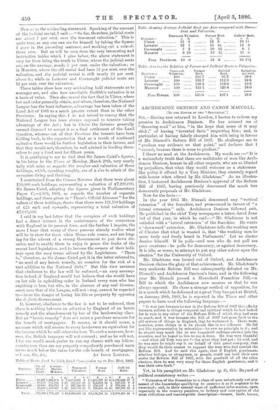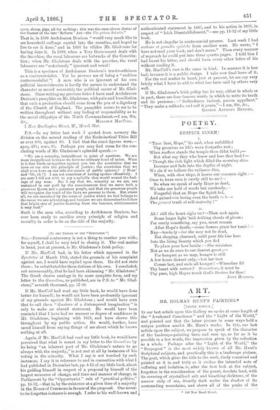ARCHDEACON DENISON AND CANON MACCOLL.
pro THE EDITOR OP THE " SRECTATOR:]
Sis,—Having now returned to London, I hasten to redeem my promise to Archdeacon Denison. He has accused me of " throwing mud" at him, " in the hope that some of it may stick ;" of having "invented facts" respecting him ; and, in particular, of baying falsely charged him with being in favour of Mr. Disraeli's Reform Bill of 1867. He challenges .me to " produce any evidence on that point," and declares that I "cannot, because there is none to produce."
I threw no mud at the Archdeacon. My words are :—" It is a melancholy truth that there are multitudes of men like Arch- deacon Denison, honest in all other respects, who are so blinded by prejudices, that what they would welcome as a statesman- like policy if offered by a Tory Minister, they sincerely regard with horror when offered by Mr. Gladstone." As an illustra- tion, I instanced Archdeacon Denison's approval of the Reform Bill of 1867, having previously denounced the much less democratic proposals of Mr. Gladstone.
Now for the facts :- In the year 1865 Mr. Disraeli denounced any "vertical extension " of the franchise, and pronounced in favour of "a
lateral extension " only. Archdeacon Denison followed suit. He published in the chief Tory newspapers a letter, dated June 3rd of that year, in which he said :—" Mr. Gladstone is not satisfied with a lateral extension' of the franchise. He wants
a downward' extension. Mr. Gladstone tells the working men of Chester that what is wanted is, that 'the working men be more truly and freely heard in Parliament.' Let no elector deceive himself. If he polls—and men who do not poll are poor creatures--he polls for democracy, or against democracy. It is idle, or worse, to attempt to put any other colour upon the election " for the University of Oxford.
Mr. Gladstone was turned oat of Oxford, and Archdeacon Denison claims the glory of that achievement. Mr. Gladstone's very moderate Reform Bill was subsequently defeated on Mr.. Disraeli's and Archdeacon Denison's lines, and in the following year Mr. Disraeli passed a Household Franchise Bill,—a Bill to which the Archdeacon now assures us that he was always opposed. He chose a strange method of opposition, for in a speech which he delivered at a great Tory banquet at Bristol, on January 28th, 1868, he is reported in the Times and other papers to have used the following language :- " It was just because he saw in the Reform Bill of 1867 that affinity between reform in things temporal and spiritual which be had looked for in vain in any other of the Reform Bills of which they had seen so much, and it was because the Bill of 1867 had gone back to the old system of things in England, that he welcomed it. There were, however, some things in it he should like to see different. He did not like representation by minorities—he saw no principle in it ; and he should very much like to see household suffrage carried into the counties, and he hoped to live to see it done. He was very thankful —and what old Tory was not ?—for what they had got ; he said, and he was sure he might say it on behalf of that great company, that they. would do their utmost to ,support the men who had carried the Reform Bill. And he said this again, that if English gentlemen, whether bishops, or clergymen, or people, could not hold their own under the Reform Bill of 1867, with the goodwill of all the other electors, then ha was very sorry for those English gentlemen, .and it was their own fault."
Yet, in his pamphlet on Mr. Gladstone (p. 8), this Bayard of Political consistency writes :-
" Extension of the Franchise to a class of men notoriously cot pos- sessed of the-knowledge qualifying to exercise it as it rtquires to be exercised ; and, in their natural want of sufficient infor mation, open, especially in the country parishes, to bribery and corruption of the most ridiculous and contemptible description—houses, lands, horses, cows, sheep, pigs, all for nothing ; this was the over-clever device of the framer of the late Reform ' Act—the Via prima Salutis."
That is, in 1868 Archdeacon Denison " would very much like to see household suffrage carried into the counties, and hoped to live to see it done," and in 1886 he vilifies Mr. Gladstone for having done it. In 1868, when a Tory Government deals with the franchise, the rural labourers are bulwarks of the Constitu- tion ; when Mr. Gladstone deals with the question, the rural labourers are " notoriously " ignorant and venal!
This is a specimen of Archdeacon Denison's trustworthiness as a controversialist. Yet he accuses me of being a " reckless controversialist "! A man who is so ignorant of his own
political inconsistencies is hardly the person to understand the character or record accurately the political career of Mr. Glad- stone. Since writing my previous letter I have read Archdeacon Denison's pamphlet on Mr. Gladstone, with pain and humiliation that such a production should come from the pen of a dignitary of the Church of England. The pamphlet seems to me to be written throughout without any feeling of responsibility as to the moral obligation of the Ninth Commandment.—I am, Sir, P.S.—In my letter last week I quoted from memory the division on the second reading of the Ecclesiastical Titles Bill as over 400, against 90. I find that the exact figures were,— ayes, 438; noes, 95. Perhaps you may find room for the con- cluding words of Mr. Gladstone's splendid speech :-
" We are a minority, insignificant in point of numbers. We are more insignificant because we have no ordinary bond of union. What is it that binds us together against you but the conviction that we have on our side the principle of justice ; the conviction that we shall soon have on our side the course of public opinion ? (` Hear' and ' 06, oh !') I am not conscious of having spoken offensively. I am sure I did not wish to say a syllable that would wound the feel- ings of any man. But I say that we, minority as we. are, are sustained in our path by the consciousness that we serve both a generous Queen and a generous people, and that the generous people will recognise the truth of the facts we present to them. Bat, above all, we are sustained by the sense of justice which we feel belongs to the cause we are advocating, and because we are determined to fellow that bright star of justice beaming from the heavens, whithersoever it may lead."
Such is the man who, according to Archdeacon Denison, has ever been ready to sacrifice every principle of religion and morality in order to be on the side of the majority.



































 Previous page
Previous page